2019-2020
Law Auditorium, Rooms 204/205
3600 John McCormack Dr NE
2018-2019
"The Role of Archives and Records in Justice and Human Rights," Presented by Former Acting Archivist of the United States Trudy Huskamp Peterson, CA.
Wednesday, February 27, 2019, 6:00-8:00 pm
Catholic University, Pryzbyla Center, Great Room C,
620 Michigan Avenue, NE, Washington, DC
Transportation: We recommend taking Metro, Brookland-CUA Metro stop – Red Line
Parking available in law school garage
Register early at https://arma-nova.org/Programs (no fee, but there is a limit of 60 people for this event)
AGENDA
6:00 – 7:00 pm Registration, food (heavy hors d’oeuvres) and networking
7:00 – 8:00 pm Presentation
OUR SPEAKER
Since retiring from her 24 years with the National Archives and Records Administration, former Acting Archivist of the United States Trudy Huskamp Peterson has provided consulting services and volunteer time to governments, agencies, and non-governmental organizations around the world. There is a common theme to most of her activities, which is the role that archives and records play in realizing justice and human rights. In this presentation she will share her perspective and insights from her work with the Open Society Archives in Budapest, Hungary, the United Nations High Commissioner for Refugees, the International Council on Archives’ Human Rights Working Group, multiple truth commissions, and police records.
Co-sponsored by Catholic University and the Metropolitan Maryland Chapter of ARMA
Please contact CatholicU LIS (cua-lis@cua.edu) at least one week prior to the event to request disability accommodations. In all situations, a good faith effort (up until the time of the event) will be made to provide accommodations.
"Digitizing the Black Experience," a lecture with Dr. Lopez Matthews, Digital Production Librarian at Howard University
2017-2018
"From Sumerian Clay to MARC: A Broad History of the Card Catalog," with Peter Devereaux
November 7, 2017, 6:30 p.m.
Byron Auditorium - Columbus School of Law
Background: The lecture traces the history of the card catalog from its earliest precursors through the height of its popularity as the Library of Congress centralized the distribution of catalog cards and the eventual transition to MARC and online catalogs. Mr. Devereaux will also discuss how the cards at the Library are still valuable and kept for a reason while juxtaposing their continued utility with the nostalgia they can evoke.
Biographical sketch: Peter Devereaux is a writer-editor with the Library of Congress Publishing Office where he writes, edits, and conducts research for Library publications. He got his start in publishing editing for various scholarly publications and for Lippincott Williams & Wilkins before becoming a librarian for the Enoch Pratt Free Library in Baltimore. Peter has a B.A. in Philosophy and English from Towson University and completed graduate studies in Library and Information Science at the University of Maryland in College Park. He lives in Baltimore with his wife and their two children.
Resources:
"The Radio Preservation Task Force of the Library of Congress" with Dr. Josh Shepperd
September 14, 2017, 6:30 p.m.
Byron Auditorium - 205 Columbus School of Law
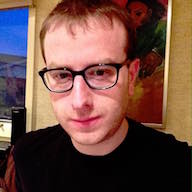 Biographical sketch: Dr. Josh Shepperd is Assistant Professor of Media and Communication at Catholic University in Washington D.C. Josh serves as National Director of the Library of Congress’s Radio Preservation Task Force, a digital humanities consortium of 200 professors and 400 archives. In 2017 Josh has assumed the role of Sound History Fellow with the Library of Congress’s National Recording Preservation Board. His organizing work has been featured by NPR Marketplace, The Atlantic Monthly, Poynter, C-Span, and CBS Radio.
Biographical sketch: Dr. Josh Shepperd is Assistant Professor of Media and Communication at Catholic University in Washington D.C. Josh serves as National Director of the Library of Congress’s Radio Preservation Task Force, a digital humanities consortium of 200 professors and 400 archives. In 2017 Josh has assumed the role of Sound History Fellow with the Library of Congress’s National Recording Preservation Board. His organizing work has been featured by NPR Marketplace, The Atlantic Monthly, Poynter, C-Span, and CBS Radio.
Josh’s book looks at the institutional origins of civic media in work conducted by the media reform movement, Office of Education, FCC, and commercial broadcasters during the New Deal. His research been supported by the Mellon Foundation, Rockefeller Archive, CLIR, and the Library of Congress.
Resources:
- Colloquium flyer (pdf)
2016-2017
"Managing Difficult Heritage through an Augmented Reality Archive" with Dr. Joshua Samuels
March 29, 2017, 6:30 p.m.
Byron Auditorium - 205 Columbus School of Law
Abstract: Recent conceptions of “difficult heritage” emphasize the complex ways that people engage sites or events associated with violence, trauma, conflict, or embarrassment. In these contexts, the preservationist drive to curate sites, objects, texts, and memories may become morally and ethically charged, and countered by competing arguments to allow them to be ignored or forgotten. Recent developments in augmented reality, specifically those enabled through smart phone apps, may offer a solution. This talk will explore this potential management strategy in the context of Fascist-period villages built in Sicily in the late 1930s and early 1940s.
Biographical sketch: Dr. Samuels is an historical archaeologist and cultural anthropologist with expertise in “difficult” heritage, landscape archaeology, and Geographic Information Systems (GIS). His primary research focuses on small villages and farm houses constructed under Italy’s Fascist regime in the 1930s and 1940s, and how various groups of people relate to their material remains today. He has also conducted fieldwork in Crete, the mid-Atlantic States, Arizona, and California, in time periods ranging from the Iron Age to the present day.
Josh received his Ph.D. from Stanford University’s Department of Anthropology in 2013, and an MSc in Archaeomaterials from the University of Sheffield in 2004. Before coming to CUA, he taught anthropology and archaeology courses at Stanford University and North Dakota State University, and worked as a GIS Specialist in Cultural Resource Management (CRM). His research has been supported by the Wenner-Gren Foundation, the Mellon Foundation, and the Barbieri Endowment at Trinity College.
Resources:
"Attracting the Best and Brightest" with Dr. Daniel O'Connor
November 9, 2016, 6:30 p.m.
Byron Auditorium - 204 Columbus School of Law
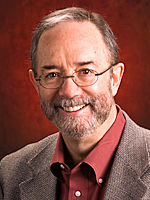 Abstract: Library and Information Science (LIS) educational programs have had a traditional connection to libraries but that link is wearing thin. There are many reasons for this, including the feeling on the part of many, that librarianship is being overshadowed by the several information fields. The crisis confronting libraries of all types could be defined by their long-term, unprecedented decline in funding. This financial decline, which stifles innovation and inhibits the ability to support core services or pay appropriate compensation to employees, was ignored by the American Library Association (ALA) in its March 2015 State of America’s Libraries report. Unlike other institutions and professions, our collective of academic, school, and public libraries did not grow financially during the tremendous economic expanse from the mid-1990s to 2008. Rather, funding levels for libraries have continued to decline and many libraries have seen their percent of institutional or municipal budgets seriously cut over the past several decades. The attractiveness of choosing a library career may be tempered by the downward spiral libraries are now experiencing and the concomitant decline in articulated standards by accredited library education programs. If librarianship is to thrive and expand, then it will need to attract the best individuals in our society. The future potential of a library career is also dampened by some projections that there is a decline in job opportunities combined with low pay. Significant changes may be needed to make librarianship attractive and productive if top individuals are to choose librarianship as a career. If that is not possible, then librarianship may need to merge into other fields that are perceived to perform the functions associated with libraries.
Abstract: Library and Information Science (LIS) educational programs have had a traditional connection to libraries but that link is wearing thin. There are many reasons for this, including the feeling on the part of many, that librarianship is being overshadowed by the several information fields. The crisis confronting libraries of all types could be defined by their long-term, unprecedented decline in funding. This financial decline, which stifles innovation and inhibits the ability to support core services or pay appropriate compensation to employees, was ignored by the American Library Association (ALA) in its March 2015 State of America’s Libraries report. Unlike other institutions and professions, our collective of academic, school, and public libraries did not grow financially during the tremendous economic expanse from the mid-1990s to 2008. Rather, funding levels for libraries have continued to decline and many libraries have seen their percent of institutional or municipal budgets seriously cut over the past several decades. The attractiveness of choosing a library career may be tempered by the downward spiral libraries are now experiencing and the concomitant decline in articulated standards by accredited library education programs. If librarianship is to thrive and expand, then it will need to attract the best individuals in our society. The future potential of a library career is also dampened by some projections that there is a decline in job opportunities combined with low pay. Significant changes may be needed to make librarianship attractive and productive if top individuals are to choose librarianship as a career. If that is not possible, then librarianship may need to merge into other fields that are perceived to perform the functions associated with libraries.
Biographical sketch: Daniel O. O’Connor has his MSLS and Ph.D. from Syracuse University and he is currently an Associate Professor in the Department of Library and Information Science at Rutgers where he teaches research methods in the undergraduate, masters and doctoral programs at the School of Communication & Information. At the graduate level he has also taught courses in Data Analytics, Evaluation of Library and Information Services and Systems, Financial Management, Cataloging and Classification, Collection Development and Management, and Information Sources in Science and Technology. His dissertation dealt with library catalog design. He has served as an elected member of the Council of the American Library Association (ALA), chaired ALA’s Education Committee, chaired its Committee on Research and Statistics, and served as a member of ALA’s Committee on Accreditation. He has also served on the Executive Board and Public Policy Committee of the New Jersey Library Association. Dan O’Connor recently served as a nationally elected member the Executive Committee of the American Association of University Professors. At Rutgers, Dan O’Connor is the past-chair of the New Brunswick Faculty Council which includes over 60 academic departments on the flagship campus. He has served on the Executive Committee of the University Senate and as a co-chair of its Budget Committee. Dan O’Connor has served on over 50 dissertation committees at Rutgers and several dissertation committees at other universities in the U.S. and internationally. He has served as the President of the Rutgers Faculty Union (AAUP/AFT), as its Chief Negotiator, as Chair of its Committee A on Academic Freedom, and as a long-term member of its Executive Council. Dan O’Connor is the current Past-President of the New Jersey State Conference of the American Association of University Professors, representing over 7,500 faculty and professional staff at 13 higher education institutions. He is currently Chair of the NJ Higher Education Leadership Council representing the interests of over 31,000 New Jersey faculty and staff. He has held consulting positions with the New York Public Library and the Metropolitan Museum of Art. He and Phil Mulvaney have served as consultants to Queens College and they are currently consultants to Pratt Institute and Clarion University advising them on their upcoming ALA accreditation.
Resources:
"Applying Scientific and Mathematical Techniques to Digital Humanities" with Dr. Aaron Dominguez
October 19, 2016, 6:30 p.m.
Byron Auditorium - 204 Columbus School of Law
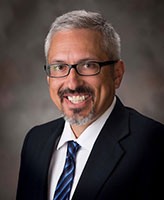 Biographical sketch: Dr. Aaron Dominguez joined the School of Arts and Sciences from his previous position as the Associate Dean for Research and Global Engagement and a Full Professor of Physics and Astronomy at the University of Nebraska-Lincoln (UNL). Dr. Dominguez, whose area of research is experimental high energy physics, has a strong history of research and grant activity, including a National Science Foundation (NSF) CAREER grant, continuous funding for the past twelve years, and a recent cooperative agreement with the NSF for $11.5 million. As part of this award, Dr. Dominguez led a team that included researchers from ten universities in the construction of the next generation of particle detectors for the group’s Compact Muon Solenoid experiment at the Large Hadron Collider operated by the CERN Laboratory in Geneva, Switzerland.
Biographical sketch: Dr. Aaron Dominguez joined the School of Arts and Sciences from his previous position as the Associate Dean for Research and Global Engagement and a Full Professor of Physics and Astronomy at the University of Nebraska-Lincoln (UNL). Dr. Dominguez, whose area of research is experimental high energy physics, has a strong history of research and grant activity, including a National Science Foundation (NSF) CAREER grant, continuous funding for the past twelve years, and a recent cooperative agreement with the NSF for $11.5 million. As part of this award, Dr. Dominguez led a team that included researchers from ten universities in the construction of the next generation of particle detectors for the group’s Compact Muon Solenoid experiment at the Large Hadron Collider operated by the CERN Laboratory in Geneva, Switzerland.
Resources:
2015-2016
"The Vatican Library: the Making and Unmaking of its Collections" with Dr. Massimo Ceresa
October 21, 2015, 6 p.m.
Byron Auditorium - 204 Columbus School of Law
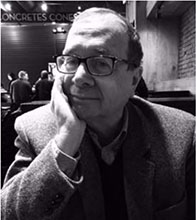 Abstract: Since the fifteenth century, the Vatican Library has enriched its collections through acquisitions, gifts, or annexations. From the beginning, collectors of major libraries entrusted them to the Vatican as gifts, while in the eighteenth and nineteenth centuries, state laws favored the acquisition of monastic and religious libraries. In the twentieth century, impoverished noble families often sold off their collections to Library. At the same time, however, the Vatican Library collections suffered considerable losses due to its position as the papal library and its international reputation as a treasure trove of incomparable riches. This lecture aims to show how, through gains and losses, the collection stands in its current form.
Abstract: Since the fifteenth century, the Vatican Library has enriched its collections through acquisitions, gifts, or annexations. From the beginning, collectors of major libraries entrusted them to the Vatican as gifts, while in the eighteenth and nineteenth centuries, state laws favored the acquisition of monastic and religious libraries. In the twentieth century, impoverished noble families often sold off their collections to Library. At the same time, however, the Vatican Library collections suffered considerable losses due to its position as the papal library and its international reputation as a treasure trove of incomparable riches. This lecture aims to show how, through gains and losses, the collection stands in its current form.
About the speaker: About the speaker: Dr. Massimo Ceresa recently retired as Reference Librarian from the Biblioteca Apostolica Vaticana, where he worked for 40 years. He is the author of numerous articles and books on the history of printed books and of libraries. His recent book is an edited volume entitled, La Biblioteca Vaticana tra riforma cattolica, crescita delle collezioni e nuovo edificio (1535-1590) (Città del Vaticano, 2012), the second in the series, Storia della Biblioteca Apostolica Vaticana, for which he won the Premio Borghese in 2014. For many years he taught at the Vatican Library School and the University of Tor Vergata (Roma 2), one of Rome’s three universities. He currently serves as Adjunct Professor in the Department of History at the Catholic University of America where he teaches a course on the “History of the Book.”
Resources:
2014-2015
"Libraries, A Call to Action" with Donna Scheeder
November 12, 2014, 6:00 p.m.
Byron Auditorium - 204 Columbus School of Law
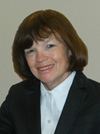 Abstract: Current trends represent change — change that requires action by librarians and information professionals. Join us as Ms. Scheeder discusses the IFLA trend report and how we as a profession must build a change agenda at the personal, organizational, national and global levels.
Abstract: Current trends represent change — change that requires action by librarians and information professionals. Join us as Ms. Scheeder discusses the IFLA trend report and how we as a profession must build a change agenda at the personal, organizational, national and global levels.
About the speaker: Donna Scheeder currently serves as president-elect of the International Federation of Library Associations and Institutions, (IFLA), the global voice of libraries. She has served on the IFLA Governing Board previously for 6 years, and has been a member of the Standing Committee on Libraries and Research Services for Parliaments for 8 years. As President-elect, she has presented keynote speeches to the World E-Parliament conference in Seoul and to the national meetings of the Italian, Spanish and most recently the Croatian Library Association.
She is also the Deputy Chief Information Officer at the Congressional Research Service, Library of Congress. She is responsible for Knowledge Management, Content Management, Records and Archives, Video Production and the Web Analytics program areas. Previously she served as Director, Law Library Services, at the Law Library of the Library of Congress from 2004 to 2010. Earlier, she held a number of positions with increasing responsibilities at the Congressional Research Service.
She is a former President and Treasurer of the Special Libraries Association (SLA), an SLA fellow, member of the SLA Hall of Fame, and a recipient of SLA’s John Cotton Dana award. She is a member of the Advisory Board for both the Computers in Libraries and Internet Librarian conferences. Internationally she has conducted workshops for the Global Center for ICT in Parliaments, and presented papers and conducted workshops in Japan, Brazil, Australia, and Canada in response to invitations from officials of those governments.
Resources:
"Beyond Browse: Mobilizing Digital Collections and Engaging User" with Dr. Sharon Leon
October 20, 2014, 6:00 p.m.
Byron Auditorium - 204 Columbus School of Law
 Abstract: For nearly twenty years, libraries, museums, and archives have been diligently working to digitize their collections. Now we must put those collections to work in ways that both build community, and are sustainable. How can we serve our collections in a wide range of venues? How can we more effectively engage our users in productive dialogue? How can we invite the innovative use of our collections? How can we draw upon users' interests to guide our digital project development? How can we employ light-weight open source web publishing platforms, such as Omeka, to facilitate this work? This talk will explore these questions and others by drawing examples from innovative digital public history and humanities projects.
Abstract: For nearly twenty years, libraries, museums, and archives have been diligently working to digitize their collections. Now we must put those collections to work in ways that both build community, and are sustainable. How can we serve our collections in a wide range of venues? How can we more effectively engage our users in productive dialogue? How can we invite the innovative use of our collections? How can we draw upon users' interests to guide our digital project development? How can we employ light-weight open source web publishing platforms, such as Omeka, to facilitate this work? This talk will explore these questions and others by drawing examples from innovative digital public history and humanities projects.
About the speaker: Sharon M. Leon is the Director of Public Projects at the Roy Rosenzweig Center for History and New Media and Associate Professor of History at George Mason University. Leon received her B.A. in American Studies from Georgetown University, and her doctorate in American Studies from the University of Minnesota. Her first book, An Image of God: the Catholic Struggle with Eugenics, was published by University of Chicago Press (May 2013). Leon oversees collaborations with partners from around the country, directs exhibit and archiving projects, as well as research and tool development for public history, including Omeka and Scripto. Finally, Leon writes and presents on using technology to improve the teaching and learning of historical thinking skills.
Resources:
"Libraries Are Not Their Buildings" with Richard Reyes-Gavilan
September 15, 2014, 6:00 p.m.

What does the future hold for the District of Columbia Public Libraries?
CUA LIS students, faculty, alumni and friends were treated to an intriguing talk by Richard Reyes-Gavilan, at the kickoff of the Fall Colloquium Series held Monday, September 15, on campus.
Mr. Reyes-Gavilan shared with the audience the challenges the 26-campus library system faces and the innovative, creative solutions to deal with budgets, buildings, infrastructure, and partnerships with the public and charter schools. He discussed the transformation the library is going through to serve D.C. residents and how the library will bring literacy in unexpected places.
Reyes-Gavilan also announced for the first time in public the upcoming 50 X 15 program soon to be launched — an online rapid-fire suggestion box for staff.
Resources:
"The Library of Congress: Acquisitions, Access, and Authenticity" with David Mao
February 27, 6:00 p.m.
Room 205 Columbus School of Law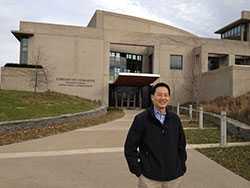 Abstract: Originally founded to serve the United States Congress and the Supreme Court of the United States, the Law Library of Congress is today the world’s largest law library, and its mandate has expanded to include serving the legal information needs of the nation and the world. David S. Mao, Law Librarian of Congress, talks about the creation of world’s largest collection of legal heritage, the access challenges to materials in various formats, and the importance of authentic versions of primary legal information.
Abstract: Originally founded to serve the United States Congress and the Supreme Court of the United States, the Law Library of Congress is today the world’s largest law library, and its mandate has expanded to include serving the legal information needs of the nation and the world. David S. Mao, Law Librarian of Congress, talks about the creation of world’s largest collection of legal heritage, the access challenges to materials in various formats, and the importance of authentic versions of primary legal information.
About the speaker: David S. Mao is the 23rd Law Librarian of Congress. He manages the Law Library of Congress, which contains the world’s largest collection of legal materials and serves as the leading research center for foreign, comparative, and international law. Previously he served as Deputy Law Librarian and as a section head in the Congressional Research Service. Mr. Mao is a magna cum laude graduate of The George Washington University. He earned his law degree from the Georgetown University Law Center, and was in private practice for several years before pursuing a master’s degree in library science at The Catholic University of America. Before entering government service, he held positions at the Georgetown University Law Library and within the research library of the international law firm of Covington and Burling LLP. Mr. Mao has served as treasurer and board member of the American Association of Law Libraries, and currently is treasurer and a board member of the Chinese and American Forum on Legal Information and Law Libraries, of which he is a founding member. A member of the American Bar Association, he is admitted to the District of Columbia and Pennsylvania Bars.
Resources:
"Navigating the Storms of Change: How Emotional Intelligence Leadership Works" with Camila Alire
November 12, 2013
Great Room A, Pryzbyla Center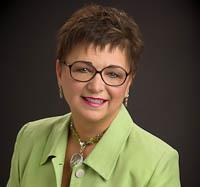 Abstract: Dealing with change is so prevalent in our libraries today. And, dealing with that change is no easy task. Some staff welcome it; others fear it. Dr. Alire presents a leadership theory that has contributed to her success and that of her various management teams in navigating the storms of change. Real life events such as disaster recovery and major library reorganizations are the basis for her talk.
Abstract: Dealing with change is so prevalent in our libraries today. And, dealing with that change is no easy task. Some staff welcome it; others fear it. Dr. Alire presents a leadership theory that has contributed to her success and that of her various management teams in navigating the storms of change. Real life events such as disaster recovery and major library reorganizations are the basis for her talk.
About the speaker: Dr. Camila Alire is recognized as a library leader through her professional positions, service, and scholarship. She is Dean Emerita at the University of New Mexico and Colorado State University. Her service leadership includes the presidency of the American Library Association (2009) and of national REFORMA (1993). Her scholarship includes books on academic librarianship, emotionally intelligent leadership, library services to Latino communities; and disaster planning/recovery. Her many awards include the ALA/Lippincott Award for Distinguished Service; the CALA Presidential Recognition Award, the ALA Achievement in Library Diversity Research Award, and the National REFORMA’s Librarian of the Year Award. She was recently nominated by President Obama to serve on the National Council on the Humanities. She received her MLS from the University of Denver and her doctorate in Educational Leadership from the University of Northern Colorado.
Resources:
2012-2013
Colloquium with Roberta Shaffer
February, 2012
Abstract: This presentation explores some of the social trends that provide challenges and opportunities for libraries and librarians in the 21st century. It also touches upon some initiatives currently underway at the Library of Congress, America's Center of Knowledge, to provide leadership for the nation and the world.
About the speaker: Recently appointed Associate Librarian for Library Services at the Library of Congress, Roberta served as adjunct coordinator of the law librarianship specialization at SLIS while concurrently directing research services at the law firm of Covington and Burling. Her rich and diverse background includes a year as Fulbright Senior Research Scholar at the Tel Aviv University Faculty of Law; service as dean and professor at the Graduate School of Library and Information Science at the University of Texas at Austin, as executive director of the Federal Library and Information Center Committee/Federal Library Network (FLICC/FEDLINK), and as the 22nd Law Librarian of Congress. Shaffer earned her A.B. at Vassar College; her M.L.S. at Emory University, and J.D. at Tulane University School of Law.
Resources:
"Preservation, Language, and Other Challenges of Digital Scholarship: The Case of the Iranian Internet" with Dr. Niki Akhavan
November 12, 2012, 6:00 p.m.
108 Hannan Hall
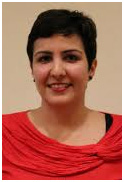 Abstract: Notoriously factionalized at the level of state powers and oppositional forces alike, shifts in the Iranian political scene occur regularly but unpredictably. As such, an examination of the Iranian Internet requires approaches that can account for the richness of both new media developments and the social and political contexts in which they are received. While many of the difficulties that arise in this regard are unique to the specificities of the Iranian Internet, they provide opportunities for reflecting on the challenges of digital scholarship more broadly. In outlining research obstacles and the solutions devised to address them, this presentation considers what lessons the case of the Iranian Internet might hold for scholars and professionals concerned with the study and management of information on the Internet.
Abstract: Notoriously factionalized at the level of state powers and oppositional forces alike, shifts in the Iranian political scene occur regularly but unpredictably. As such, an examination of the Iranian Internet requires approaches that can account for the richness of both new media developments and the social and political contexts in which they are received. While many of the difficulties that arise in this regard are unique to the specificities of the Iranian Internet, they provide opportunities for reflecting on the challenges of digital scholarship more broadly. In outlining research obstacles and the solutions devised to address them, this presentation considers what lessons the case of the Iranian Internet might hold for scholars and professionals concerned with the study and management of information on the Internet.
About the speaker: Niki is an Assistant Professor of Media Studies at The Catholic University of America. Her research examines the relationship between New Media technologies and Iranian transnational political and cultural production, with a specific interest in how state actors have participated in and reacted to New Media landscapes. She recently completed a manuscript, Electronic Iran: The Cultural Politics of an Online Evolution, which is currently under review for publication. She has published on the Iranian blogosphere as well as the role of other forms of media in contemporary Iran.
Resources:
"The Embedded Librarian: Taking Knowledge Where It's Needed" with Professor David Shumaker
September 24, 2012, 6:00 p.m.
Room 321, Pryzbyla Student Center
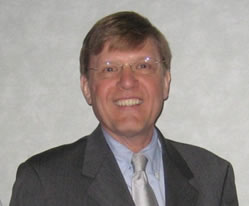 About the presentation: Professor Shumaker’s new book, The Embedded Librarian, is the first comprehensive survey of the growing practice of embedding librarians into teams as partners with the individuals and groups that need their expertise. In this presentation, he will discuss key themes from the book: what distinguishes embedded librarianship from traditional professional practice, the forces driving this new model, and how embedded librarians are increasing their value to their employers and society.
About the presentation: Professor Shumaker’s new book, The Embedded Librarian, is the first comprehensive survey of the growing practice of embedding librarians into teams as partners with the individuals and groups that need their expertise. In this presentation, he will discuss key themes from the book: what distinguishes embedded librarianship from traditional professional practice, the forces driving this new model, and how embedded librarians are increasing their value to their employers and society.
About the speaker: David Shumaker has been Clinical Associate Professor at the School of Library and Information Science, Catholic University of America since 2006. His research focuses on the emergence of new roles for librarians in all types of organizations. Previously, Dave was a corporate librarian at the MITRE Corporation, where he served as Manager of Information Services, with responsibility for corporate records, archives, and library services. He was the 2009 recipient of the Special Libraries Association’s Rose Vormelker Award, and he blogs at embeddedlibrarian.com.
Resources:
"Collections and Data and Use: the New Scale of Digital Preservation" with Leslie Johnston
October 18, 2012, 6:00 p.m.
106 Hannan Hall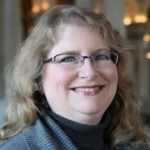 About the presentation: What is the biggest insight that we have learned in fifteen years of building and stewarding digital collections? That we can never guess every way that our collections will be used. More and more researchers want to use collections as a whole, mining and organizing the information in novel ways. Researchers increasingly use algorithms to mine the rich information and tools to create pictures that translate that information into knowledge. Datasets are not just scientific and business tables and spreadsheets: our collections are now considered data. This presentation will cover case studies around large data collections, and discuss potential new preservation and access service models for libraries.
About the presentation: What is the biggest insight that we have learned in fifteen years of building and stewarding digital collections? That we can never guess every way that our collections will be used. More and more researchers want to use collections as a whole, mining and organizing the information in novel ways. Researchers increasingly use algorithms to mine the rich information and tools to create pictures that translate that information into knowledge. Datasets are not just scientific and business tables and spreadsheets: our collections are now considered data. This presentation will cover case studies around large data collections, and discuss potential new preservation and access service models for libraries.
About the speaker: Leslie Johnston has over twenty years experience in digitization and digital conversion. As Chief of Repository Development at the Library of Congress, she manages technical architecture initiatives in the National Digital Information Infrastructure and Preservation Program. Previously, she served as the head of access services at the University of Virginia Library. Her experience includes instructional technology and library information systems work at the Harvard Design School, Stanford University; and the Getty Research Institute. She has also been active in the museum community, working for various museums and teaching courses on museum systems.
Resources:
2009-2010
"The Public Library and the Civic Imaginary: The Case of Cleveland" with Dr. Jennifer Horne
September 29, 2009, 5:00 p.m.
132 Marist Hall
Abstract: This talk recovers fragments of the all-too-often overlooked history of how American public libraries adapted to the introduction of multimedia technologies, especially motion pictures – offering instances of institutional reaction and individual action strikingly parallel to our own digital age transformation.
Taking the Cleveland Public Library in the 1920s and 30s as a focus, this presentation treats that library’s leadership in the area of public library-film partnerships as indicative of national trends in area of visual instruction. Ideas about commercial recreation, both the widespread and vanguard, deeply affected how public libraries approached the "problem" of motion pictures and movie houses. The analysis examines how the state public library system at the time introduced a notion of civic spectatorship peculiar to its vision of its own library patrons.
About the speaker: Dr. Horne is Assistant Professor in the Department of Media Studies. Her articles have appeared in Afterimage, The Historical Journal of Film, Radio, and Television, and The Moving Image. She provided voiceover commentary for two of the sponsored silent films included on the Treasures III DVD collection. Dr. Horne is a member of the Library of Congress’ National Film Preservation Board, co- chair of the Women Film Pioneers special interest group of the Society for Cinema and Media Studies, and a co-Executive Secretary of Women and Film History International, which sponsors the bi-annual and international conference, "Women and the Silent Screen." Dr. Horne received a 2009 NEH Summer Stipend for her current book project, Civic Cinema: Spectatorship, Citizenship, and American Silent Film, funded in part by the NEH "We the People" initiative.
Resources:
"America's Growing Amnesia: The Challenge of Saving, Cataloging and Preserving Audio Visual Materials" with Dr. Patrick Loughney
October 19, 2009, 6:00 p.m.
132 Marist Hall
About the speaker: During a career of over 30 years, Patrick Loughney has served as a cataloger, archivist, historian and curator of audio visual material produced since the 19th century. He has a Ph.D. in American Studies from George Washington University and currently serves as Chief of the Packard Campus for Audio Visual Conservation at the Library of Congress. During 2004 through 2008, Dr. Loughney served as Curator of the Motion Picture Department and Director of the L. Jeffrey Selznick School of Film Preservation at the George Eastman House Museum, Rochester NY.
Resources:
"The World Digital Library" with Allene Hayes
November 5, 2009, 6:00 p.m.
132 Marist Hall
Abstract: The World Digital Library (WDL) http://www.wdl.org makes available on the Internet, free of charge and in multilingual format, significant primary materials from countries and cultures around the world. Ms. Hayes will provide an overview of WDL from initiation, through development of the project, to the release of the digital library – with an emphasis on the important role of metadata in realizing the project’s vision.
About the speaker: Allene Hayes is the Digital Projects Coordinator of the Acquisitions and Bibliographic Access Directorate (ABA) at the Library of Congress. She is responsible for overseeing the training of metadata specialists, developing the workflow for processing electronic resources, and the cataloging of monographic and integrating electronic resources acquired by LC. Ms. Hayes is a member of the International Federation of Libraries and Associations (IFLA) World Digital Library Working Group, and holds leadership positions on the American Library Association (ALA) Council; the Association for Library Collections and Technical Services (ALCTS) Electronic Resources Interest Group; and the Executive Board of the Black Caucus of ALA. She has published several articles on digital initiatives. Ms. Hayes studied at Clark College in Atlanta, Ga., and completed her undergraduate study at Richmond College in London, England. She completed a graduate program at the University of Oxford; and received her Master’s in Library Science from the University of Maryland.
Resources:
"Google for Librarians" with Dan Martin
February 24, 2010, 6:00 p.m.
132 Marist Hall
Abstract: Google for Librarians will present advanced tips and tricks for how to work smarter and faster online. We'll focus on how to better use Google's tools to be more efficient and effective in your research, and will answer your questions about all things Google.
About the speaker: Dan Martin joined Google's Washington, D.C. office in 2007 as a company spokesperson. He oversees the company's Public Policy Blog and leads Google's communications efforts on issues including telecommunications policy, immigration, patent reform, and cyber security.
Resources:
"Alternative Search Tools: Why Researchers Need to Go Beyond Google" with Dr. Ran Hock
March 22, 2010
Resources:
2008-2009
"Achieving Relevance: The University Library in the 21st Century" with Bill Mayer
November 11, 2008, 5:00 p.m.
132 Marist Hall
About the speaker: William "Bill" A. Mayer was appointed University Librarian for American University in May 2007. From 2001-2007, Bill served as the Associate University Librarian for Information Technology and Technical Services at The George Washington University, where he was responsible for developing, implementing, and integrating information technology services across the entire library system operation. He served as an adjunct faculty for the School of Library and Information Science at CUA in 2005 and 2006. Bill began his library career at MIT and also worked at the Harvard Business School before moving to the Washington DC area. Bill is an international speaker and leader on the changing face of services in libraries, managing organizational change and the innovative applications of technology in library and university systems and he was GW’s first Frye Leadership Institute Scholar in 2005.
He received his MLS degree from Simmons College in Boston.
Resources:
"The U.S. Book Publishing Industry: 2006-2011" with Professor Albert N. Greco
November 12, 2008, 4:15 p.m.
132 Marist Hall
Abstract: This presentation will provide a timely assessment of current trends and forecasts, including:
- The state of the U.S. book industry 2006-2011 (revenues; units; consumer expenditures);
- A review of the trade and juvenile book categories, including where people buy books and what influences their decisions;
- The transformation of the book industry from print to digital products; data on eBook sales; library book purchases; and
- An update on "market anomalies" that could impact consumers and the book industry in 2009-2012.
About the speaker: Albert N. Greco is the author or editor of nine scholarly books, including The Culture and Commerce of Publishing in the 21st Century (Stanford University Press; 2007), which was awarded the Alpha Sigma Nu Award for the best new professional (business) book published in the last three years. He is completing The State of Scholarly Communication: Challenges and Opportunities (Transaction), which he edited and will be published in 2009. He is the author or co-author of sixteen scholarly journal articles; and his papers have been presented at Harvard, Oxford, Cambridge, The Library of Congress, The World Bank, etc.
Resources:
"Achieving Relevance: Special Libraries in the 21st Century" with Stephen Abram
November 17, 2008, 7:00 p.m.
132 Marist Hall
About the speaker: Stephen Abram, MLS, is an association junkie. He was President 2004-2005 of the Canadian Library Association, president 2002 of the Ontario Library Association and has served twice on the Special Libraries Association international board of directors. He is currently also Vice President Innovation for SirsiDynix where he helps predict the future of libraries, technology and user behavior. He has been VP of Corporate Development for Micromedia ProQuest and Publisher, Electronic Information for Thomson. He has run libraries for Suncor, Coopers & Lybrand, Smith Lyons Torrance Stevenson and Mayer and The Hay Group. Stephen has been listed by Library Journal as a "Mover and Shaker", one of the "key" people influencing the future of libraries and librarianship. He has been awarded SLA's John Cotton Dana Award as well as being a Fellow of the SLA. He was Canadian Special Librarian of the Year and Alumni of the Year for the Faculty of Information Studies at the University of Toronto. He is an adjunct professor at the University of Toronto, Faculty of Information Studies. Stephen gives well over 50 international keynote talks annually to library and information industry conferences and articles and columns for, among others, Information Outlook, Feliciter, Multimedia & Internet @ Schools, and Library Journal. Recently he has enjoyed a few radio and television appearances promoting libraries. Stephen is celebrating his 25th year since his MLS graduation with his two children (Zachary, 20 and Sydney, 17) and his wife Stephanie Smith Abram, an author and teacher. He sleeps very well but not a lot.
Resources:
"African American Folklore at the Library of Congress: From Personal Research to Public Access" with Dr. Michael Taft
February 19, 2009, 5:00 p.m.
132 Marist Hall
Abstract: Dr. Taft will discuss his own research in African American blues lyrics, how it has intersected with the large collection of African American folklore at the archive of the American Folklife Center, Library of Congress, and the Center’s challenges in both preserving and presenting its African American materials in the digital age.
About the speaker: Michael Taft has been the head of the archive of the American Folklife Center at the Library of Congress since 2002. A folklorist for over 35 years, he holds a PhD in Folklore from Memorial University of Newfoundland and an MLIS from the University of Alberta.
Previously, he has been university archivist at the University of Northern British Columbia, archivist at the Vermont Folklife Center, and sound & image librarian and curator of the Southern Folklife Collection in the Wilson Special Collections Library at the University of North Carolina at Chapel Hill. He has taught or been a visiting scholar at several universities, including University of Saskatchewan, Saint Mary’s University, Mount Saint Vincent University, and Indiana University. He has published a number of monographs on folklore and oral history, as well as several books on the blues, including The Blues Lyric Formula (2006), Talkin’ to Myself: Blues Lyrics, 1921-1942 (2005), and Blues Lyric Poetry: A Concordance (1984).
Resources:
